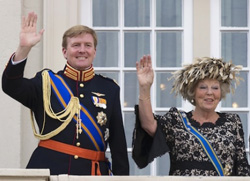Dutch Queen to Abdicate in Favor of Her Son
Daily News Article — Posted on January 30, 2013

Netherlands’ Queen Beatrix and Prince Willem-Alexander wave to well-wishers from the balcony of the Royal Palace …
(by Robin VanDaalen, The Wall Street Journal) AMSTERDAM – Queen Beatrix of the Netherlands said she would abdicate after 33 years on the throne, to be succeeded in the largely ceremonial role by her eldest son, 45-year-old Willem-Alexander.
The queen, who turns 75 this week, announced her abdication in a prerecorded televised address Monday. The coincidence of her birthday and the celebration of the 200th anniversary of the Kingdom of the Netherlands was the reason for her decision, she said.
“It seems like a good point in time to take this step, which I’ve been thinking about for several years,” the queen said. “The coincidence of these two special events has been the occasion for me to decide to step down from my position.”
The investiture will take place in Amsterdam on April 30, when the Dutch celebrate Queen’s Day. The date marks the birthday of Queen Beatrix’s mother, Queen Juliana, who was queen from 1948 until April 1980.
In 1966, Beatrix married Claus von Amsberg, who died in 2002. They had three sons, Prince Willem-Alexander, Prince Friso and Prince Constantijn. The eldest, Willem-Alexander, has been prince of Orange – the title of the Dutch heir apparent – since the queen’s investiture in 1980.
“It is with the greatest confidence that I will pass on the throne on April 30 to my son, prince of Orange,” the queen said. “He and Princess Máxima are fully prepared to take on their future task,” she said.
Unlike in the U.K., where 86-year-old Queen Elizabeth celebrated her 60th anniversary on the throne last year and has given no sign she intends to abdicate, Dutch monarchs have a tradition of abdication. Queen Beatrix’s mother Juliana abdicated at age 70 after 32 years on the throne, and her mother, Queen Wilhelmina, in 1948 after reigning for 50 years.
[Willem-Alexander will become the first Dutch king since Willem III, who reigned until his death in 1890. A member of the International Olympic Committee, he is a trained pilot and expert in water management who has long been groomed for the throne.] [He courted controversy however, with his choice to marry investment banker Maxima Zorreguieta, whose father was an agriculture minister in the military junta that ruled Argentina with an iron fist in the late 1970s and early ’80s.] He married Princess Máxima, who was born and grew up in Argentina and was formerly an emerging-market equity-sales executive based in New York, in 2002. They have three daughters, Princess Catharina-Amalia, Princess Alexia and Princess Ariane. Catharina-Amalia will be first in line to succeed [her father]. …Queen Beatrix’s second son, Friso, has been in a coma since a skiing accident last year. Constantijn, the youngest, is currently deputy head of cabinet for Neelie Kroes, vice president of the European Commission, who is responsible for the commission’s digital agenda within the European Union.
The queen, who holds a law degree, returned last week from an official visit to Brunei and Singapore, where she was accompanied by her eldest son and his wife.
In recent years, controversy over the lack of transparency of her role in the formation of governments resulted in a change in the procedure. For the first time after elections this year, the negotiators who head the talks to form a government were no longer appointed by the queen, as head of state, but instead were appointed by a majority in parliament. And ministers are now sworn in by the queen during a public ceremony, rather than behind closed doors, as was previously the custom.
Willem-Alexander completed his military service in 1987. His education included a degree in history from the University of Leiden, the Netherlands, and attendance at an advanced development program at the Kellogg School of Management at Northwestern University in Illinois. …
This year marks the 200th anniversary of the Kingdom of the Netherlands, which also comprises the Caribbean island countries of Aruba, Curaçao and Sint-Maarten, and three special municipalities – Bonaire, Sint-Eustatius and Saba – which are small islands in the Caribbean.
Copyright 2012 Dow Jones & Company, Inc. All Rights Reserved. Reprinted here for educational purposes only. Visit the website at wsj.com.
Background
THE NETHERLANDS HAS A CONSTITUTIONAL MONARCHY:
- A constitutional monarchy is a form of government in which a monarch acts as head of state within the guidelines of a constitution...
- This form of government differs from absolute monarchy in which an absolute monarch serves as the source of power in the state and is not legally bound by any constitution and has the powers to regulate his or her respective government.
- Most constitutional monarchies employ a parliamentary system in which the monarch may have strictly ceremonial duties or may have reserve powers, depending on the constitution.
- Under most modern constitutional monarchies there is also a prime minister who is the head of government and exercises effective political power. (from wikipedia)
